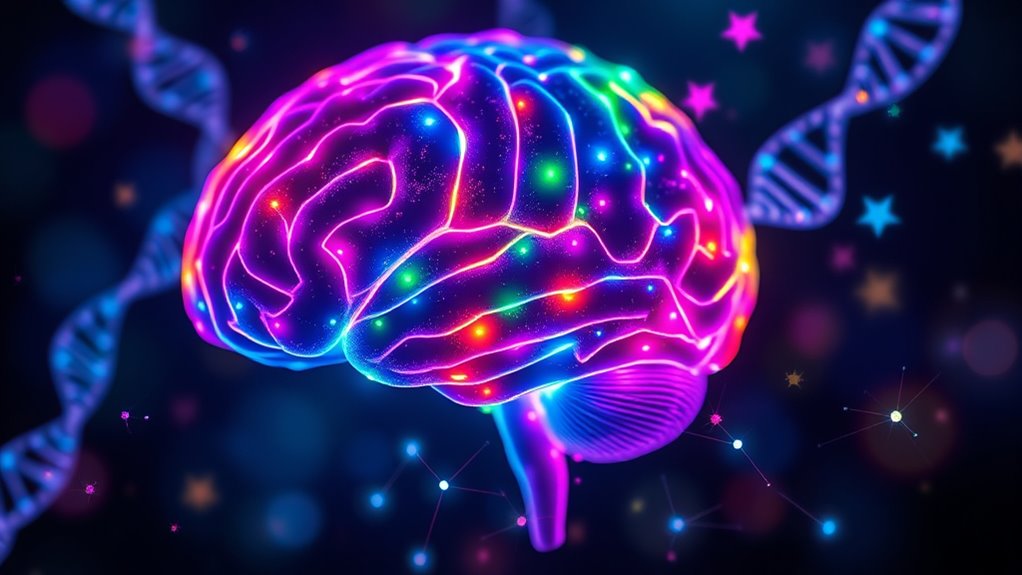Your lifestyle choices directly affect how your genes are expressed through epigenetic mechanisms like DNA methylation and histone modification. Things like your diet, stress levels, toxin exposure, and physical activity can turn genes on or off, impacting your health and even that of future generations. These changes are reversible and responsive to your environment. If you want to understand how to optimize your well-being by influencing gene activity, keep exploring this fascinating connection.
Key Takeaways
- Lifestyle factors like diet, stress, toxins, and activity can induce reversible epigenetic modifications that regulate gene activity.
- Nutrient-rich foods promote beneficial gene expression, while processed foods may cause harmful epigenetic changes.
- Physical activity improves gene regulation, supporting metabolic health and reducing inflammation.
- Chronic stress and environmental toxins can lead to epigenetic alterations linked to health risks like cancer and heart disease.
- Epigenetic changes can be inherited, meaning lifestyle choices today can affect future generations’ gene expression.

Have you ever wondered how your daily choices can influence your genes? The fascinating field of epigenetics shows that your lifestyle doesn’t just affect your immediate health but can also alter gene regulation in ways that last a lifetime. Unlike genetic mutations, which change your DNA sequence, epigenetic modifications switch genes on or off without changing the underlying code. These modifications are heavily influenced by environmental impact — everything from your diet and stress levels to exposure to toxins and physical activity can shape how your genes function.
When you make certain lifestyle decisions, you’re engaging in a form of biological communication with your genes. For example, eating a nutrient-rich diet can promote beneficial gene expression, while processed foods laden with chemicals might trigger epigenetic changes that increase disease risk. Physical activity is another powerful tool; regular exercise has been shown to modify gene regulation in ways that improve metabolic health and reduce inflammation. Conversely, chronic stress can induce epigenetic alterations that negatively impact your immune system and mental health. These changes happen through mechanisms like DNA methylation and histone modification, which influence how tightly or loosely your genetic material is packed, ultimately controlling gene activity.
Your environment acts as a constant reminder to your genes about how to behave. Exposure to environmental toxins like pollution or cigarette smoke can lead to epigenetic changes that increase the likelihood of respiratory issues, cancers, or cardiovascular diseases. These influences can even be passed down to future generations, illustrating the profound impact your lifestyle choices have not just on you but potentially on your descendants. This illustrates the remarkable flexibility of your genome; it’s not fixed but responsive to your surroundings and behaviors.
Frequently Asked Questions
Can Epigenetic Changes Be Passed Down Through Generations?
You might wonder if epigenetic changes can pass down through generations. The answer is yes; heritage inheritance allows some epigenetic marks to be preserved, influencing your traits. Ancestral influences can shape your gene expression without altering DNA sequences. This means lifestyle choices and environmental factors from previous generations could impact your health and traits, showing that epigenetics connects your heritage to your present and future.
How Quickly Can Lifestyle Changes Affect Gene Expression?
You wonder how quickly lifestyle changes can influence gene activation. It varies, but methylation speed plays a key role, with some gene expression modifications occurring within days or weeks. For example, adopting healthier habits like diet and exercise can lead to rapid methylation changes, altering how genes are expressed. Your actions directly impact gene activation, showing that lifestyle choices can have swift effects on your genetic regulation.
Are There Specific Diets That Optimize Epigenetic Health?
You can optimize your epigenetic health by focusing on nutrient timing and incorporating dietary antioxidants into your diet. Eating foods rich in antioxidants, like berries and vegetables, helps protect your DNA from damage. Timing your nutrient intake around meals can support gene regulation and overall wellbeing. By making these targeted dietary choices, you actively influence your gene expression, promoting better health and resilience over time.
What Role Does Stress Play in Epigenetic Modifications?
Did you know that prolonged stress can alter your DNA through epigenetic pathways? Stress impact is significant, as it triggers chemical changes that turn genes on or off, affecting health long-term. These modifications can influence mental health, immune function, and even aging. By managing stress through techniques like meditation or exercise, you can positively influence your epigenetic pathways, helping maintain better overall health and resilience against stress-related diseases.
Can Exercise Reverse Harmful Epigenetic Changes?
You might wonder if exercise impact can reverse harmful epigenetic changes. Research shows that physical activity promotes epigenetic reversibility, meaning it can modify gene expression patterns affected by negative factors. By engaging regularly in exercise, you actively influence your genes, potentially reversing some detrimental epigenetic marks. This highlights the power of lifestyle choices, like exercise, to positively shape your genetic health over time.
Conclusion
By now, you see how your daily choices truly shape your genes. Your lifestyle isn’t just about today; it’s about planting seeds for your future health. Every healthy habit is a step toward a better tomorrow, proving that you hold the power to turn the tide. Remember, you can’t change the cards you’re dealt, but you can certainly play them well—what you do today echoes in your genes tomorrow.









